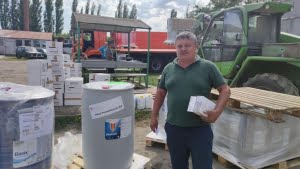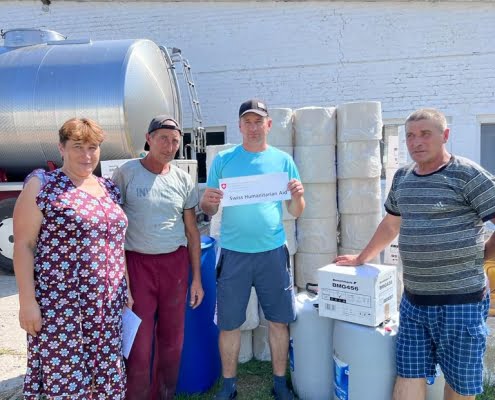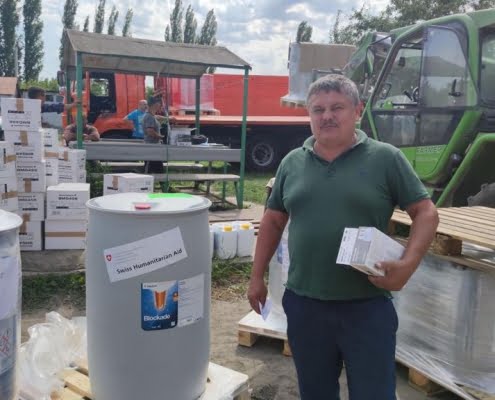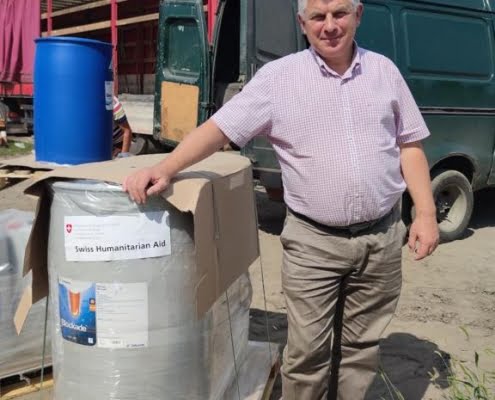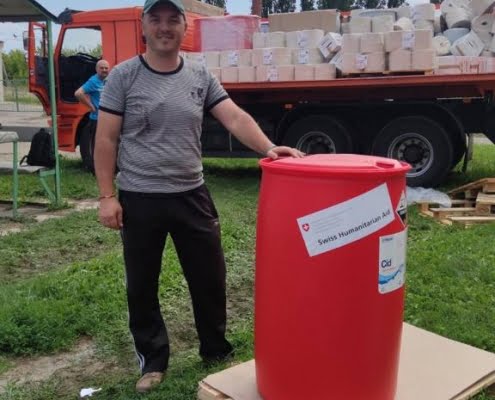Switzerland is providing almost UAH 100 million in humanitarian aid to dairy producers in the regions which suffered from hostilities, i.e. Chernihiv, Kyiv and Sumy oblasts. Thus, at the request of the Ministry of Agrarian Policy of Ukraine, the humanitarian project, which is coordinated by the Embassy of Switzerland in Ukraine, is implemented with the financial support of the Swiss government in cooperation with the Association of Milk Producers (AMP), International Charitable Foundation #SaveUA, and the State Service of Ukraine on Food Safety and Consumer Protection. The project is aimed at ensuring food security in general and, in particular, through improved access for the Ukrainian population to quality and safe milk and dairy products produced in Ukraine. The important prerequisite for this is ensuring proper milk production and storage hygiene, as well as animal health. “To support the financial viability of farms and improve access to necessary hygiene products for milk production through Swiss support, although limited in time”, Viktor Shutkevych, National Programme Officer in Economic Development at the Swiss Embassy in Ukraine, highlights the role of another humanitarian aid. “Humanitarian aid will be provided in the amount of a three-month supply of hygiene products. It is expected that, by the end of the project in November 2022, these farms will be able to significantly improve their financial situation thanks to restored supply chains”. Since 2012, Switzerland has been supporting the dairy sector and competent authorities of Ukraine with the purpose of establishing a risk-based safety control system in the dairy value chain. Back then, at the beginning of this cooperation, only 6% of milk received for processing was of ‘Extra’ grade (equivalent to the EU requirements), and at the beginning of 2022, every third liter of milk (32%) was in line with the EU criteria which the local dairy sector is seeking to achieve. This increase is the result of continuous improvement of both production practices and proper hygiene, as well as strengthening of institutional capacity, for reinforcement of which considerable contribution has been made by technical assistance projects with the financial support of Switzerland. It should be noted that, in spite of the war in Ukraine, the Swiss-Ukrainian program “Higher Value Added Trade from the Organic and Dairy Sector in Ukraine” (QFTP) continued its activity in order to maintain and support the target sectors. In particular, in the dairy sector, the focus is placed on supporting the veterinarian`s capacity with the purpose of avoiding animal disease outbreaks which present a risk for mid- and long-term food security, food safety, and human health. Thus, the project of veterinary and consulting support of affected farms in Chernihiv, Kyiv, and Sumy oblasts is implemented in cooperation with the milk quality lab Uman Labs and AMP Consultative Centre. Over 100 farms in target oblasts have already received recommendations on recovering livestock productivity, feeding, raw milk quality and safety control, human resources management in the frame of onsite audits, where possible, as well as based on the raw milk laboratory test results. Therefore, with the support of Switzerland, comprehensive support for affected primary milk producers in deoccupied oblasts is provided in order to return the sector on the right track, which makes an important contribution to ensuring food security in Ukraine and sustainability of rural development. For reference: as of 1 August 2022, as many as 232 farms confirmed the need for humanitarian aid, including 95 in Chernihiv oblast, 78 in Kyiv oblast, and 59 in Sumy oblast. Humanitarian aid will be provided in the form of cleaning and disinfection products for milking equipment, products for pre- and post-dipping, napkins for udder hygiene, gloves, reagents for subclinical mastitis detection, disinfectants for livestock facilities, etc. The majority of products will be purchased from local suppliers to maintain the established relations with agricultural enterprises, and resume their production practices and technologies in line with the recommendations of milking equipment manufacturers. For the list of recipient farms visit.
